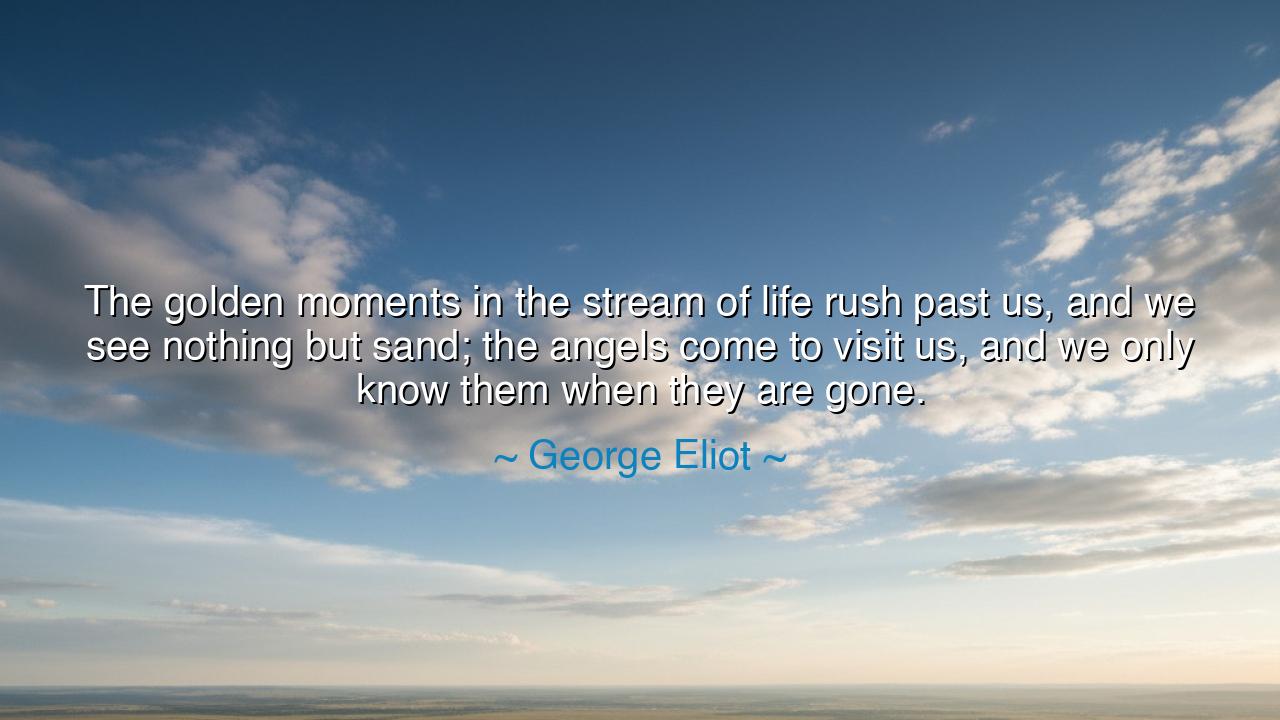
The golden moments in the stream of life rush past us, and we see
The golden moments in the stream of life rush past us, and we see nothing but sand; the angels come to visit us, and we only know them when they are gone.






"The golden moments in the stream of life rush past us, and we see nothing but sand; the angels come to visit us, and we only know them when they are gone." These poignant words of George Eliot speak to the fleeting nature of life and the moments of beauty and grace that pass us by unnoticed. In the great stream of life, we are often so consumed by our daily struggles, our concerns, and the sands of time that we fail to recognize the golden moments that are right before us. And the angels, those moments of divine inspiration, joy, or love, often visit us quietly, only to leave us with the realization of their preciousness once they have passed. Eliot’s words remind us that life is not only about the journey but about recognizing and cherishing the moments that make it worth living.
This teaching echoes the ancient wisdom of Heraclitus, who observed that life is a constant flux, a river that never flows the same way twice. Just as we cannot step into the same river twice, we cannot capture the same moment again. The golden moments—those moments of joy, peace, or connection—are like flashes of light that appear and disappear with the flow of time. Yet, we are often too caught up in the current, too focused on the sand, the mundane or the trivial, to truly see or appreciate the beauty that passes us by. The ancient philosophers taught that awareness—the ability to live fully in the present moment—was the key to true wisdom. It is only when we pause, step out of the rush, and reflect that we can recognize the beauty of the fleeting present.
The great Roman Stoic, Seneca, wrote extensively about the brevity of life and how easily time slips through our fingers. He warned that life could be consumed by distractions and trivialities, with the most important moments often passing unnoticed. He said, “It is not that we have a short time to live, but that we waste a lot of it.” Like Eliot, Seneca saw how golden moments were lost in the sand—not because they didn’t exist, but because people were blind to their presence. Seneca’s philosophy urged people to make the most of each day, to live with purpose, and to recognize the angels of joy, connection, and wisdom that visit us in fleeting moments. His teachings emphasize the importance of mindfulness—of being truly present—so that we do not live in regret for the moments that slipped away unnoticed.
Consider the story of Helen Keller, whose life is an embodiment of grasping the golden moments in a world that so often overlooks them. Keller, who was both deaf and blind, lived in a world of darkness and silence, but she learned to cherish and recognize the beauty in the small, profound moments of life that others often take for granted. Her connection to the world, through the touch of others, the feel of nature, and the warmth of human love, was a reflection of Eliot’s wisdom. Keller’s ability to find joy and meaning despite immense challenges is a testament to the importance of recognizing life’s golden moments, no matter how fleeting or imperceptible they might seem. She knew that each moment was a blessing—a precious gift that should not be overlooked, for once it passes, it may never return.
But it is often in retrospect that we realize just how precious those moments were. Think of King Solomon, renowned for his wisdom, who in the book of Ecclesiastes, muses on the vanity of life. He reflects on how human beings chase after meaning and pleasure, only to find that these things are fleeting—like sand slipping through our fingers. Solomon, having experienced the heights of power and wealth, understands that true contentment does not lie in possessions or status, but in the quality of moments shared with others, in peace, and in gratitude. Much like Eliot’s angels, these moments of peace or connection often come and go, only to be fully appreciated once they are lost.
The lesson here is both humbling and empowering. We must learn to be present, to recognize the beauty and sacredness of the moments that are often lost in the rush of life. Life is not about the quantity of time, but the quality of time spent. We must ask ourselves: are we seeing the angels in our lives—the moments of grace, beauty, and love—as they come? Or are we too distracted, too caught up in the sand, to recognize them? The task, then, is to cultivate the awareness to cherish and live fully in the present, to find meaning in the seemingly mundane, and to be grateful for the golden moments before they pass us by.
In practical terms, this means slowing down, becoming mindful of the present, and embracing the beauty and meaning that surrounds us each day. We must seek out the golden moments, not as isolated events but as a continuous thread of grace woven through the fabric of life. Whether through a shared smile, a kind word, a moment of stillness in nature, or a quiet reflection on life’s blessings, let us open our eyes to the angels that come to visit us. And when they leave, may we carry their warmth with us, always grateful for the preciousness of each fleeting moment.






AAdministratorAdministrator
Welcome, honored guests. Please leave a comment, we will respond soon